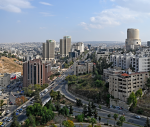You are here
A strike-full world
Sep 30,2019 - Last updated at Sep 30,2019
There are strikes and mass protests everywhere in this globalised world. The modern media and social communications networks are blamed, or credited, for this re-emerging phenomenon.
Recently, we have seen mass protests in Egypt, Algeria, Idlib (Syria) and even Russia.
In Hong Kong, Venezuela, Sudan, Tunisia and many other places, riots and protests succeeded in abolishing anti-freedom political decisions, or are still demanding better living conditions and political reform.
In Jordan, the general public has taken to the virtual arena to express its dissatisfaction with the government’s lethargy or due to inappropriate handling of disputable issues.
The Jordan Teachers Association (JTA) declared a general strike more than three weeks ago, demanding that the government implement a 50 per cent hike in the allowances given to teachers. In effect, the increment in the government teachers’ wage bill would amount to JD 115 million, which the government does not have or cannot afford.
Although professional associations in Jordan were not created to become labour unions but instad to determine the membership and qualification requirements for the practitioners of those professions and to upgrade the level of proficiency in them, they do not heed that. What has actually happened thus far is that they have become ipso facto labour unions and political entities.
The JTA was created after a long period of hankering and intra-governmental dispute. Those who opposed it are now poking their fingers in the face of supporters and shouting “we told you so”.
The relative salaries of teachers have declined overtime, but due to the quantitative expansion in the number of schools and students, the qualification and merit requirements have been slacking and reduced to a mere college degree. In countries where earnings of teachers compare highly with other jobs, teachers are qualified and work hard to earn their teaching status.
The virtual world of protests is fuelling riots and demonstrations in the physical world. In Jordan, the time lag is longer, but that should not mislead us into believing that the gap is not bridgeable.













